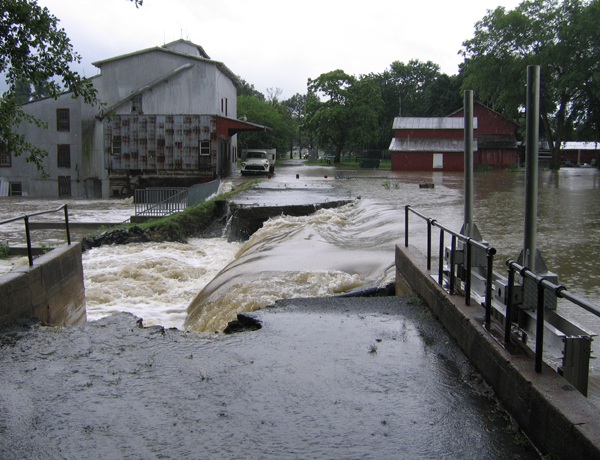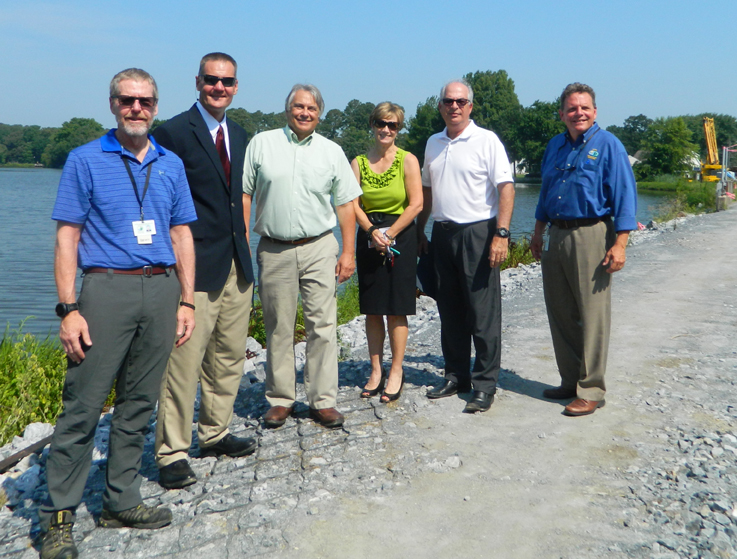SEAFORD – Along the banks of Hearns Pond north of Seaford, DNREC Secretary David Small was joined today by Division of Fish & Wildlife Director David Saveikis, State Representative Daniel Short, DNREC Dam Safety Engineer David Twing, Senior DelDOT Bridge Engineer Barry Benton and local residents for a briefing on the project to rehabilitate the aging Hearns Pond Dam and bring it into compliance with Delaware’s Dam Safety Regulations. The dam is the state’s top priority for improvements based on the risk to downstream communities and infrastructure should the dam fail.
“Hearns Pond Dam is the first total dam rehabilitation project by DNREC and DelDOT and represents the culmination of more than 10 years of work to develop a comprehensive dam safety program for the state,” said DNREC Sec. Small. “The dam’s history of failing during storms makes this reconstruction our highest priority. I am pleased to be here as we begin this DNREC-DelDOT partnership that is not only important for the safety and protection of the public, but will reduce the risk of property damage in the event of a dam emergency.”
Hearns Pond is a popular f ishing, boating and recreational area, ranking as the 7th most heavily fished state pond in Delaware with almost 10,000 angler visits per year. A recent study conducted by DNREC’s Division of Fish and Wildlife, the agency that operates and maintains the pond and boat ramp, found that 71 percent of Hearns Pond anglers use the ramp to access the pond for fishing.
ishing, boating and recreational area, ranking as the 7th most heavily fished state pond in Delaware with almost 10,000 angler visits per year. A recent study conducted by DNREC’s Division of Fish and Wildlife, the agency that operates and maintains the pond and boat ramp, found that 71 percent of Hearns Pond anglers use the ramp to access the pond for fishing.
“This project has importance beyond rehabilitating an historic dam, mill site and boat ramp. When it is completed, it will be the first dam in Delaware to meet our new regulations,” said Senior DelDOT Bridge Engineer Benton. “Perhaps more importantly, this project is the first of many that will be completed as part of a partnership with DNREC to address dams statewide. Many of our lakes and ponds were created by aging structures that need to be preserved.”
Hearns Pond Dam, like many Sussex County pond dams, was constructed for milling grain. In the early 1900’s the present-day spillway and embankment were built, creating the 66-acre pond. The historic Hearns & Rawlins Mill building, purchased by DNREC in 2013 as part of the acquisition of a privately-owned portion of the dam, is eligible to be listed on the National Register of Historic Places. The mill building will be stabilized and monitored during the dam’s reconstruction.
During storms in August 2001 and June 2006, the Hearns Pond Dam was overtopped and seriously damaged causing significant downstream flooding. In 2001 the southern section of the dam was completely washed out, flooding Route 13A. Sediment from the pond was washed into downstream waterways and wetlands, impacting water quality and wildlife habitat in the area. The dam was rebuilt in 2002, but in June 2006 was overtopped by flood waters again and the rebuilt section was partially washed away. In both the 2001 and 2006 floods, residents of a Seaford heathcare facility were relocated until floodwaters subsided.
Like many older dams across the country, the Hearns Pond Dam was not built to withstand extreme rainfall events, such as those that occurred in 2001 and 2006. In the Seaford area, the rainfall exceeded the capacity of the dam’s spillway, with rising water levels at the pond overtopping the earthen dam’s embankment, causing it to erode and ultimately fail.
The rehabilitation of the dam will include the construction of a new larger spillway and concrete blocks will be installed on the earth embankment to prevent erosion. A new boat ramp will replace the current ramp to provide improved amenities and ease-of-service that will boost recreational opportunities and visitors to the pond.
“With the flooding issues already in Seaford, this project is imperative. Having the dam in compliance with safety regulations means people downstream can rest a little easier when experiencing the next big storm, said State Senator Bryant Richardson (R- Laurel). “The new boat ramp will improve access to the pond for fishing and boating or just enjoying a beautiful and historic area. This project shows how much can be done when everyone is working together.”
“This project is a good investment in the well-being of our residents and the protection of our heritage,” said State Rep. Danny Short (R-Seaford). “It will safeguard downstream residents, help preserve a 19th Century mill, and ensure a source of local recreation for decades to come.”
In his remarks, Sec. Small spoke about the importance of the Delaware Dam Safety Program, the DNREC-DelDOT Dam Preservation Program partnership and priorities for other dam rehabilitation projects. “The Delaware Dam Safety Program provides long range plans that establish priorities and focus state resources on addressing the aging infrastructure of many of our state-owned dams. With the DNREC-DelDOT partnership in place for all dam rehabilitation projects, we’ll be able to share resources and expertise that will enhance our efforts and accomplish more. Our next priorities include rehabilitation of Records Pond Dam in Laurel, followed by Millsboro Pond Dam.”
The Hearns Pond Dam rehabilitation represents the first joint DNREC-DelDOT Dam Preservation Program project. In 2009 DNREC funded a study to evaluate the condition of the dam and develop alternatives for bringing the dam into compliance with the state’s new Dam Safety Regulations. Since then, DNREC and DelDOT have been working together to fund, design and construct the improvements.
Hearns Pond Dam construction is expected to cost $4.2 million, funded by state Bond Bill appropriations. The project is anticipated to be completed by May 2017.
The dam, boat ramp and parking lot are closed and will remain closed while the replacement dam and ramp are built. Boaters who regularly use Hearns Pond may opt to use Concord Pond, located approximately 3.5 miles southeast near Seaford, or Craigs Pond, located approximately 5 miles southwest near Seaford.
Through the Delaware Dam Safety Program, DNREC has regulatory responsibility for 41 state-owned dams. Since 2009, all state-owned regulated dams have been inspected annually and Emergency Action Plans prepared. DelDOT and DNREC also developed a dam deficiency ranking system which prioritizes state-owned dams for necessary upgrades and rehabilitation. A dam’s ranking is based on factors such as condition, spillway capacity, population and property that could be at risk should a dam fail.
DNREC and DelDOT partner on dam inspections, preparing Emergency Action Plans and coordinating maintenance, operations and emergency management activities. They also work cooperatively leveraging state funding to perform dam break inundation mapping, engineering studies and the design and construction of improvement and rehabilitation projects.
Image Credits: DNREC

